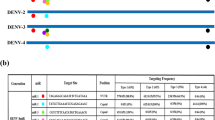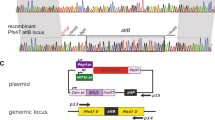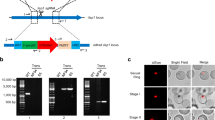Abstract
Malaria is estimated to cause 0.7 to 2.7 million deaths per year, but the actual figures could be substantially higher owing to under-reporting and difficulties in diagnosis1. If no new control measures are developed, the malaria death toll is projected to double in the next 20 years1. Efforts to control the disease are hampered by drug resistance in the Plasmodium parasites, insecticide resistance in mosquitoes, and the lack of an effective vaccine. Because mosquitoes are obligatory vectors for malaria transmission, the spread of malaria could be curtailed by rendering them incapable of transmitting parasites. Many of the tools required for the genetic manipulation of mosquito competence for malaria transmission have been developed. Foreign genes can now be introduced into the germ line of both culicine2,3 and anopheline4 mosquitoes, and these transgenes can be expressed in a tissue-specific manner5,6. Here we report on the use of such tools to generate transgenic mosquitoes that express antiparasitic genes in their midgut epithelium, thus rendering them inefficient vectors for the disease. These findings have significant implications for the development of new strategies for malaria control.
This is a preview of subscription content, access via your institution
Access options
Subscribe to this journal
Receive 51 print issues and online access
$199.00 per year
only $3.90 per issue
Buy this article
- Purchase on Springer Link
- Instant access to full article PDF
Prices may be subject to local taxes which are calculated during checkout


Similar content being viewed by others
References
Breman, J. G. The ears of the hippopotamus: manifestations, determinants, and estimates of the malaria burden. Am. J. Trop. Med. Hyg. 64s, 1–11 (2001)
Jasinskiene, N. et al. Stable transformation of the yellow fever mosquito, Aedes aegypti, with the Hermes element from the housefly. Proc. Natl Acad. Sci. USA 95, 3743–3747 (1998)
Coates, C. J., Jasinskiene, N., Miyashiro, L. & James, A. A. Mariner transposition and transformation of the yellow fever mosquito, Aedes aegypti. Proc. Natl Acad. Sci. USA 95, 3748–3751 (1998)
Catteruccia, F. et al. Stable germline transformation of the malaria mosquito Anopheles stephensi. Nature 405, 959–962 (2000)
Kokoza, V. et al. Engineering blood meal-activated systemic immunity in the yellow fever mosquito, Aedes aegypti. Proc. Natl Acad. Sci. USA 97, 9144–9149 (2000)
Moreira, L. A. et al. Robust gut-specific gene expression in transgenic Aedes aegypti mosquitoes. Proc. Natl Acad. Sci. USA 97, 10895–10898 (2000)
Ghosh, A., Edwards, M. J. & Jacobs-Lorena, M. The journey of malaria in the mosquito: hopes for the new century. Parasitol. Today 16, 196–201 (2000)
Ghosh, A., Ribolla, P. E. M. & Jacobs-Lorena, M. Targeting Plasmodium ligands on mosquito salivary glands and midgut with a phage display peptide library. Proc. Natl Acad. Sci. USA 98, 13278–13281 (2001)
Edwards, M. J., Lemos, F. J., Donnelly-Doman, M. & Jacobs-Lorena, M. Rapid induction by a blood meal of a carboxypeptidase gene in the gut of the mosquito Anopheles gambiae. Insect Biochem. Mol. Biol. 27, 1063–1072 (1997)
Pringle, G. A quantitative study of naturally-acquired malaria infections in Anopheles gambiae and Anopheles funestus in a highly malarious area of East Africa. Trans. R. Soc. Trop. Med. Hyg. 60, 626–632 (1966)
Horn, C. & Wimmer, E. A. A versatile vector set for animal transgenesis. Dev. Genes Evol. 210, 630–637 (2000)
Handler, A. M. & Harrell, R. A. II Germline transformation of Drosophila melanogaster with the piggyBac transposon vector. Insect Mol. Biol. 8, 449–457 (1999)
Horn, C., Jaunich, B. & Wimmer, E. A. Highly sensitive, fluorescent transformation marker for Drosophila transgenesis. Dev. Genes Evol. 210, 623–629 (2000)
Lemos, F. J. A., Cornel, A. J. & Jacobs-Lorena, M. Trypsin and aminopeptidase gene expression is affected by age and food composition in Anopheles gambiae. Insect Biochem. Mol. Biol. 26, 651–658 (1996)
Acknowledgements
We thank J. Snyder and G. Hundemer for help, and members of the laboratory for comments. This investigation received financial support from the UNDP/World Bank/WHO Special Programme for Research and Training in Tropical Diseases (TDR) and from the National Institutes of Health. E.A.W. acknowledges support by the Robert Bosch Foundation.
Author information
Authors and Affiliations
Corresponding author
Ethics declarations
Competing interests
The authors declare that they have no competing financial interests.
Rights and permissions
About this article
Cite this article
Ito, J., Ghosh, A., Moreira, L. et al. Transgenic anopheline mosquitoes impaired in transmission of a malaria parasite. Nature 417, 452–455 (2002). https://doi.org/10.1038/417452a
Received:
Accepted:
Issue Date:
DOI: https://doi.org/10.1038/417452a
This article is cited by
-
Population replacement gene drive characteristics for malaria elimination in a range of seasonal transmission settings: a modelling study
Malaria Journal (2022)
-
Transgenic Anopheles mosquitoes expressing human PAI-1 impair malaria transmission
Nature Communications (2022)
-
Bulk‐up synchronization of successive larval cohorts of Anopheles gambiae and Anopheles coluzzii through temperature reduction at early larval stages: effect on emergence rate, body size and mating success
Malaria Journal (2021)
-
Anopheles metabolic proteins in malaria transmission, prevention and control: a review
Parasites & Vectors (2020)
-
Characterization of an iron-inducible Haemaphysalis longicornis tick-derived promoter in an Ixodes scapularis-derived tick cell line (ISE6)
Parasites & Vectors (2019)
Comments
By submitting a comment you agree to abide by our Terms and Community Guidelines. If you find something abusive or that does not comply with our terms or guidelines please flag it as inappropriate.



